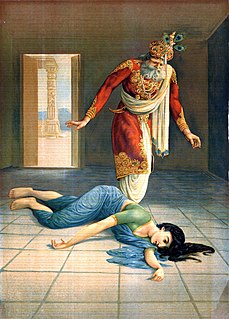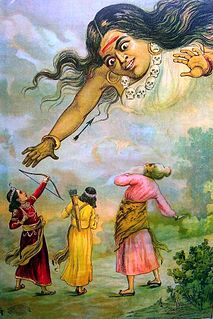
Rāmāyana is one of the two major Sanskrit epics of ancient India, the other being the Mahābhārata. Along with the Mahābhārata, it forms the Hindu Itihasa.

The following outline is provided as an overview of and topical guide to Hinduism:

In Hinduism, Daksha is one of the Prajapati, the agents of creation, as well as a divine king-rishi. He is also a Manasputra, mind created son of the creator god Brahma. The artwork shows him as an obese man with a stocky body, protruding belly, and a handsome face or the head of a goat. Scriptures mention two Daksha, born in two different Manvantara (ages).

Kaikeyi was the third consort of King Dasharatha and the Queen of Ayodhya in the Hindu epic, the Ramayana. Out of Dashrath's three wives, Kaikeyi had the most significant role. She was the princess of Kekeya and a powerful warrior, who helped her husband during a war. Kaikeyi was the mother of Bharata. Initially loving and motherly towards her stepson, Rama, Kaikeyi's mind was poisoned by Manthara, her maid. Under her influence, Kaikeyi sent Ram to the forest. After Dashrath's death, Kaikeyi realized her mistake but it was too late.

The Ashvamedha is a horse sacrifice ritual followed by the Śrauta tradition of Vedic religion. It was used by ancient Indian kings to prove their imperial sovereignty: a horse accompanied by the king's warriors would be released to wander for a period of one year. In the territory traversed by the horse, any rival could dispute the king's authority by challenging the warriors accompanying it. After one year, if no enemy had managed to kill or capture the horse, the animal would be guided back to the king's capital. It would be then sacrificed, and the king would be declared as an undisputed sovereign.

Dasharatha is described in the Hindu epic Ramayana and Vishnu Purana as the king of Kosala and the father of Rama. His capital was known as Ayodhya. Dasharatha was the son of Aja and Indumati. He had three wives: Kausalya, Kaikeyi and Sumitra, and from these unions were born Rama, Bharata, Lakshmana and Shatrughna.
Rajarishi in Hinduism and Hindu mythology, is a Royal Saint.

In the Hindu epic Ramayana, Maricha, or Mareecha is a rakshasa (demon), who was killed by Rama, the hero of the epic and an avatar of God Vishnu. He is mentioned as an ally of Ravana, the antagonist of the epic. His most notable exploit is his role in the kidnapping of Sita, Rama's wife. His son Kalanemi was killed by Hanuman.

Yajna refers in Hinduism to any ritual done in front of a sacred fire, often with mantras. Yajna has been a Vedic tradition, described in a layer of Vedic literature called Brahmanas, as well as Yajurveda. The tradition has evolved from offering oblations and libations into sacred fire to symbolic offerings in the presence of sacred fire (Agni).

Drupada, also known as Yajnasena, is a character in the Mahābhārata. The son of King Prishata, he was the king of the land of Southern Panchala. His capital was known as Kampilya.

Ramcharitmanas, is an epic poem in Awadhi language, composed by the 16th-century Indian bhakti poet Goswami Tulsidas. The word Ramcharitmanas literally means "Lake of the deeds of Rama". It is considered one of the greatest works of Hindu literature. The work has variously been acclaimed as "the living sum of Indian culture", "the tallest tree in the magic garden of medieval Indian poetry", "the greatest book of all devotional literature" and "the best and most trustworthy guide to the popular living faith of the Indian people".

Raghuvamsha is a Sanskrit mahakavya by the most celebrated Sanskrit poet Kalidasa. Though an exact date of composition is unknown, the poet is presumed to have flourished in the 5th century CE. It narrates, in 19 sargas (cantos), the stories related to the Raghu dynasty, namely the family of Dilipa and his descendants up to Agnivarna, who include Raghu, Dasharatha and Rama. The earliest surviving commentary written on the work is that of the 10th-century Kashmiri scholar Vallabhadeva. The most popular and widely available commentary, however, is the Sanjivani, written by Mallinatha (ca.1350-1450).

Dhrishtadyumna, also known as Draupada, is a character of the Hindu epic Mahabharata. He was born along with his sister, Draupadi, from a yajna organised by king Drupada of Panchala. He was the commander-in-chief of the Pandava army during the entire Kurukshetra War i.e. for 18 days. Dhrishtadyumna killed Drona, the royal guru, when he was weeping and meditating in the ongoing battle, which was against the rules of engagement.
The following is a glossary of terms and concepts in Hinduism. The list consists of concepts that are derived from both Hinduism and Hindu tradition, which are expressed as words in Sanskrit as well as other languages of India.

Taraka or Tadaka or Thataka was a demoness in the epic Ramayana. Along with her children, Maricha and Subahu, Taraka would harass and attack rishis performing yajnas in the forest. They were ultimately slain by Rama and Lakshmana on behest of their teacher, maharishi Vishwamitra.
Kaamya karmas refer to those karmas in Hinduism which are performed with a specific objective. Unlike nitya karmas, the shastras do not require daily or regular observance of these rituals. They are generally performed for the sake of their intended results. A few kaamya-karmas are listed below:

Bala Kanda is the first book of the Valmiki Ramayana, which is one of the two great epics of India. There has been debate as to whether Bala Kanda was composed by the original author Valmiki or a later addition.
Raghuvanshi or Raghuwanshi or Raghukul is a legendary Indian Kshatriya dynasty in the Itihasa-Purana mythology, considered an offshoot of the Suryavansha or the Ikshvaku dynasty lineage of kings tracing its ancestry to the sun deity Surya. Any king who belongs to Raghuvansha, as a result also belongs to Suryavansh. The dynasty is named after Raghu, a legendary king who protected the sacrificial horse of Ashwamedha from Indra. Raghuvanshi kings include Mandhata, Harishchandra, Sagara, Bhagiratha, Dilīpa, Raghu, Aja, Dasaratha and Rama.
In Jain tradition, Sagara was younger brother of Bhagvan Ajitanathaswami. son of Kshatriya King Sumitra and Queen Vijayanti (Yasomati) of Ikshvaku dynasty in Ayodhya. and was the second Chakravartin of present Avasarpiṇī. In Hindu mythology, Sagara is a prominent king of the Suryavansha dynasty in Vidarbha, and the other from royal lineage of Sivi, The Mahabharata translated by Kisari Mohan Ganguli.















